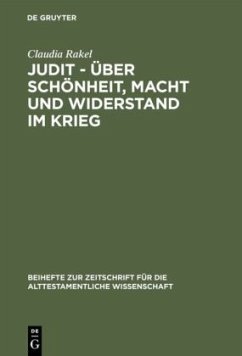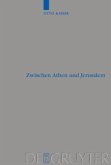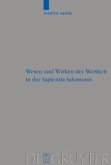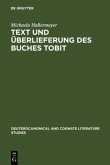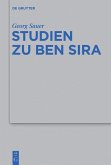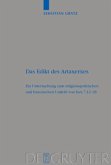The Book of Judith contains a veritable wealth of intertextual references. Models for the figure of Judith were not just provided by Moses, David and Judas Maccabeus, but also by biblical female figures who were either the victims or themselves the perpetrators of violence. The study is centred on the song in Judith 16, 1-17, which provides a theological interpretation of the events in the Book of Judith and puts forward the statement that God crushes wars. In the intertextual biblical dialogue, the Book of Judith is read as a plea for resistance to a violent regime, not with warlike means but through the strategic deployment of female beauty.
Das Buch Judit enthält eine Vielzahl intertextueller Bezüge. Vorbilder für die Juditfigur waren nicht nur Mose, David und Judas Makkabäus, sondern auch biblische Frauengestalten, die Gewalt erfahren oder selber ausüben, ebenso wie weibliche Personifikationen der Stadt Jerusalem. Im Zentrum der Studie steht das Lied in Jdt 16,1-17, das eine theologische Deutung der Ereignisse des Juditbuches liefert und die Aussage vertritt, dass Gott Kriege zerschlägt. Das Buch Judit wird im intertextuellen biblischen Dialog als ein Plädoyer für Widerstand gegen Gewaltregime gelesen, nicht mit den Mitteln des Krieges, sondern mit dem strategischen Einsatz weiblicher Schönheit.
Das Buch Judit enthält eine Vielzahl intertextueller Bezüge. Vorbilder für die Juditfigur waren nicht nur Mose, David und Judas Makkabäus, sondern auch biblische Frauengestalten, die Gewalt erfahren oder selber ausüben, ebenso wie weibliche Personifikationen der Stadt Jerusalem. Im Zentrum der Studie steht das Lied in Jdt 16,1-17, das eine theologische Deutung der Ereignisse des Juditbuches liefert und die Aussage vertritt, dass Gott Kriege zerschlägt. Das Buch Judit wird im intertextuellen biblischen Dialog als ein Plädoyer für Widerstand gegen Gewaltregime gelesen, nicht mit den Mitteln des Krieges, sondern mit dem strategischen Einsatz weiblicher Schönheit.
"Die Überschreitung der Gender-Grenzen in der Interfiguralität und die positive Würdigung eines Gewaltakts in kriegskritischem Interesse sind zwei Stränge, an denen theologisch anzuknüpfen mich die Lektüre des Buches angeregt hat."
Ilse Müllner in: Theologische Revue 2/2006
"Eine interessante und innovative Arbeit."
B. Ego in: ZAW 2005
"Viele Detailbeobachtungen machen den gut zu lesenden Text zu einem dichten Gewebe feministischer und exegetischer Fäden."
Gerlinde Baumann in: Schlangenbrut 2/2005
"This monograph is one of the most thorough studies ever written on the Book of Judith."
Jeremy Corley in: Catholic Bibilical quarterly 67/2005
Ilse Müllner in: Theologische Revue 2/2006
"Eine interessante und innovative Arbeit."
B. Ego in: ZAW 2005
"Viele Detailbeobachtungen machen den gut zu lesenden Text zu einem dichten Gewebe feministischer und exegetischer Fäden."
Gerlinde Baumann in: Schlangenbrut 2/2005
"This monograph is one of the most thorough studies ever written on the Book of Judith."
Jeremy Corley in: Catholic Bibilical quarterly 67/2005

